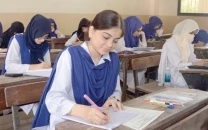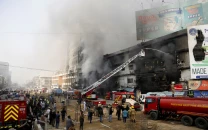Rural schools: Solar power project put on the backburner
Two oil companies had agreed to carry out the project but backtracked after ICT administration failed to pursue it.

Two oil companies had agreed to carry out the project but backtracked after ICT administration failed to pursue it. ILLUSTRATION: TRIBUNE
A glimmer of hope that school buildings in the capital’s rural areas would soon have their lights on has faded to black after the transfer of the man behind the project.
Six months after the announcement of an Islamabad Capital Territory (ICT) administration plan to install solar panels at schools in the capital’s rural areas, in collaboration with two oil companies, no headway has been made and the project now seems to have been put on the backburner.
The initiative was taken on Supreme Court orders.
The plan was started by former deputy commissioner Amir Ali Ahmed, who has since been transferred to the Capital Development Authority as the administration member.
The plan, if implemented, will not only help provide clean energy to school buildings, but also provide an opportunity to the younger generation to learn about the importance of sustainable energy.
The Supreme Court, in its order, had directed two companies exploring for oil and gas in rural areas of the capital to spend 10 per cent of their revenues on the social welfare of residents of the areas where any reserves are found.
Despite the lapse of six months, the ICT administration has failed to start the project, said an official close to the development.
He said Ahmed had held two meetings with officials from Oil and Gas Development Company (OGDC) and MOL, a Hungarian oil and gas company, which are surveying reserves in rural areas, and they had agreed to carry out the project.
“Since Ahmed left the office, the project has not progressed an inch,” said the official, adding that new Islamabad DC Mujahid Sherdil has not bothered to take up the issue with the companies.
He said that in the first phase of the project, more than 100 schools would have been hooked up with solar energy, and in the next phase, all remaining schools in these areas would be covered. There are a total of 275 schools in the capital’s rural areas.
Islamabad Model College for Boys Rawat Principal Bashir Arain confirmed that the administration has not installed solar panels in his school. He said that the students had to face constant loadshedding in the summer, and if the project had been carried out, it would have brought a great respite from the suffocating heat.
He said there were 650 students in his school alone and the number was expected to increase during the next session.
“Why would oil companies take interest in the project if the administration does not pursue it seriously,” said a school teacher while requesting not to be named.
“The government has miserably failed to facilitate students in rural areas,” said Muhammad Usman, a student of Islamabad Model School for Boys Kirpa.
The Express Tribune approached Sherdil at his office and via his cell phone, but he was not available for comment.
Published in The Express Tribune, April 13th, 2014.



















COMMENTS
Comments are moderated and generally will be posted if they are on-topic and not abusive.
For more information, please see our Comments FAQ